Key takeaways:
- Long-term mentor relationships thrive on trust, mutual respect, and consistent engagement, enhancing accountability and growth.
- Effective mentors exhibit strong communication, patience, and empathy, fostering deeper connections through shared experiences.
- Intentional strategies, such as regular communication, accepting feedback, and showing appreciation, are crucial for building and maintaining mentor relationships.
- Measuring mentorship’s impact involves both qualitative experiences and quantitative metrics, revealing the significance of mentorship on career development.
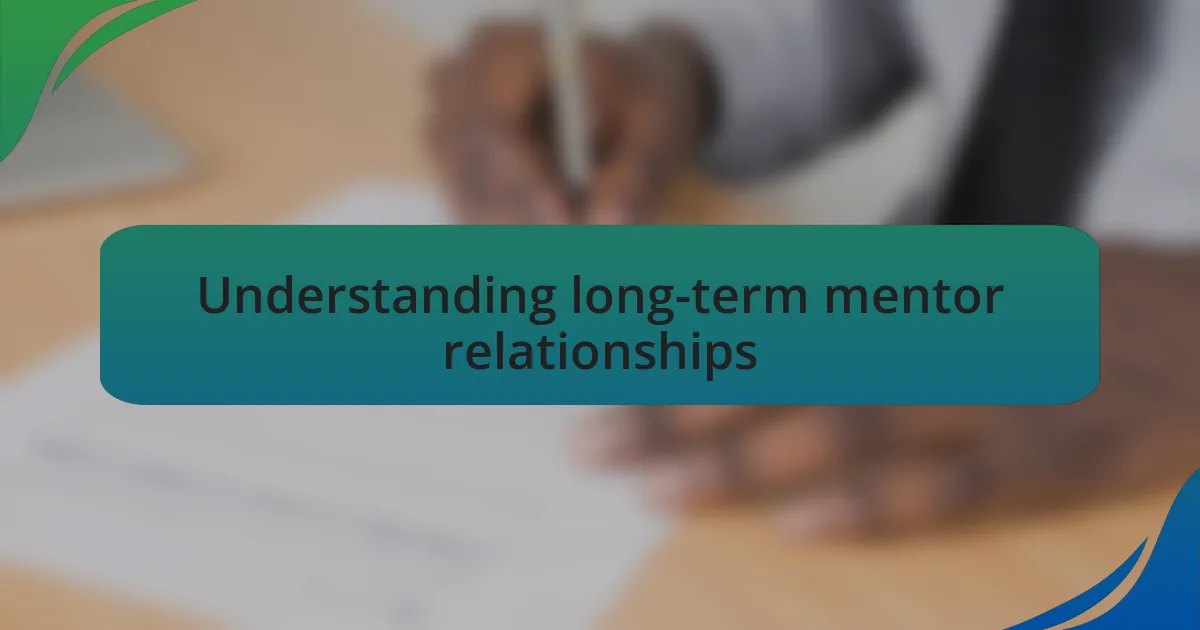
Understanding long-term mentor relationships
Long-term mentor relationships are built on trust and mutual respect, which can take time to develop. I remember my first mentor, who took a genuine interest in my growth. It was their willingness to invest time in our conversations that made a lasting impact on my career trajectory.
These relationships are often marked by shared goals and consistent engagement over time. Reflecting on my own experience, I’ve seen how regular check-ins not only provide accountability but also deepen the mentor-mentee bond. How often do we realize that growth happens not just through advice, but through the comfort of having somebody consistently in our corner?
Navigating the complexities of such relationships can be challenging yet rewarding. I often found that the most profound insights emerged during candid discussions about setbacks or failures. This two-way street of honesty opens doors to learning that isn’t just theoretical—it’s lived. How do you engage your mentor when striving to overcome obstacles? I believe those moments of vulnerability can transform the relationship, creating a true partnership in growth.
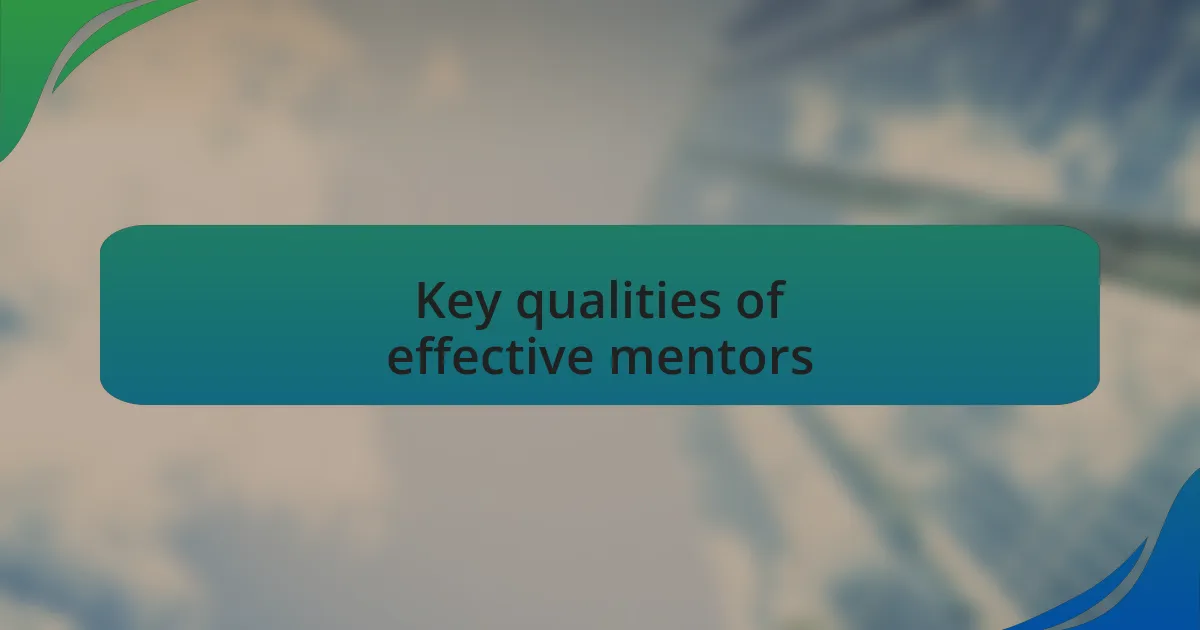
Key qualities of effective mentors
Effective mentors possess strong communication skills, which allow them to convey ideas clearly and listen deeply. In my experience, the best mentors are those who ask the right questions, prompting me to reflect and dig deeper into my own thoughts. Have you ever had a conversation where a simple question changed your perspective entirely? That’s the power of genuine dialogue.
Patience is another crucial quality. Mentoring is not about rushing to provide solutions but nurturing growth over time. I remember a particular instance where my mentor patiently let me wrestle with a problem for weeks before guiding me toward a resolution. It taught me that the journey is often just as valuable as the destination.
Lastly, effective mentors show empathy. They understand the struggles their mentees face and can relate on a human level. I once felt overwhelmed and lost in my career, but my mentor’s personal stories of similar challenges made me feel less isolated. How often do we underestimate the power of shared experiences in mentorship? When mentors genuinely connect with their mentees’ feelings, it fosters a safe space for growth and exploration.
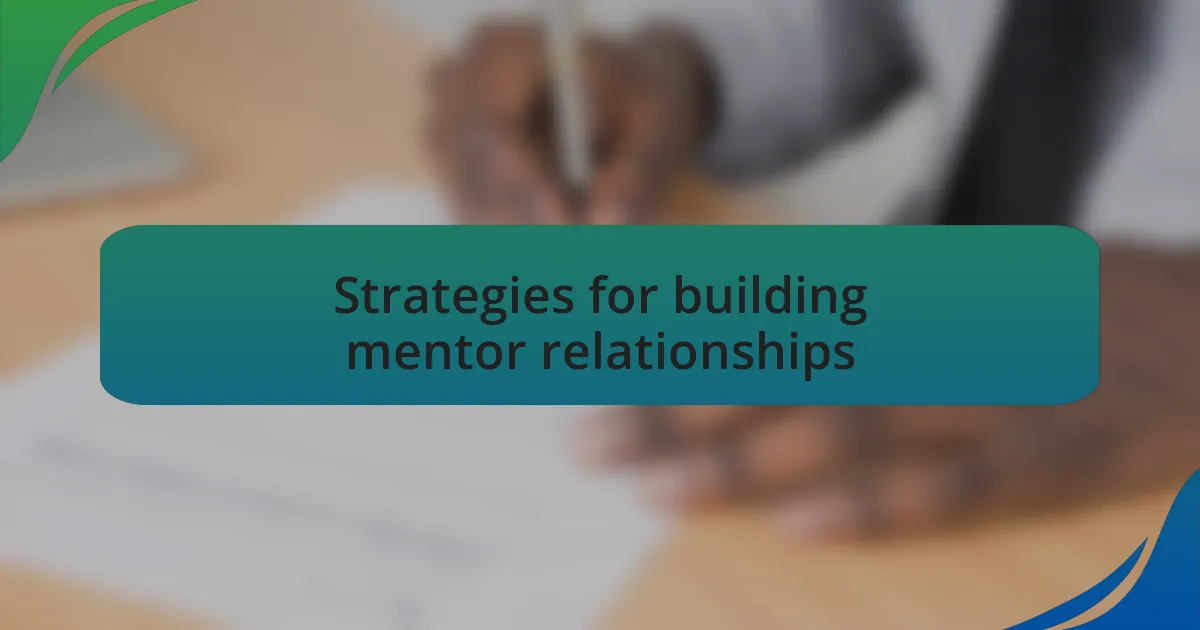
Strategies for building mentor relationships
Building strong mentor relationships requires intentional strategies. One effective approach is to establish open and consistent communication from the start. I remember when I first sought out a mentor; I made it a point to check in regularly, setting aside time each week to discuss our goals and progress. This not only kept the relationship active but also created a foundation of trust. Have you ever noticed how regular updates can create a connection that feels more personal and invested?
Another strategy is to actively seek feedback and be prepared to accept it gracefully. I once found myself receiving tough feedback about my approach to a project. Initially, it stung, but I soon realized that my mentor was trying to push me toward greater excellence. How often do we shy away from critique, fearing it will dismantle our confidence? Embracing feedback is not just about improving—it’s a sign of respect for the mentor’s experience and insights.
Lastly, showing appreciation regularly can significantly enhance your mentor relationship. A simple thank you can go a long way, but I found that sharing specific instances of how my mentor’s advice impacted my journey made a deeper impression. For example, I once wrote a heartfelt note after successfully presenting an idea, crediting my mentor’s guidance as pivotal. Have you ever acknowledged how someone shaped your path? It strengthens the bond and reminds mentors that their efforts truly matter in your development.
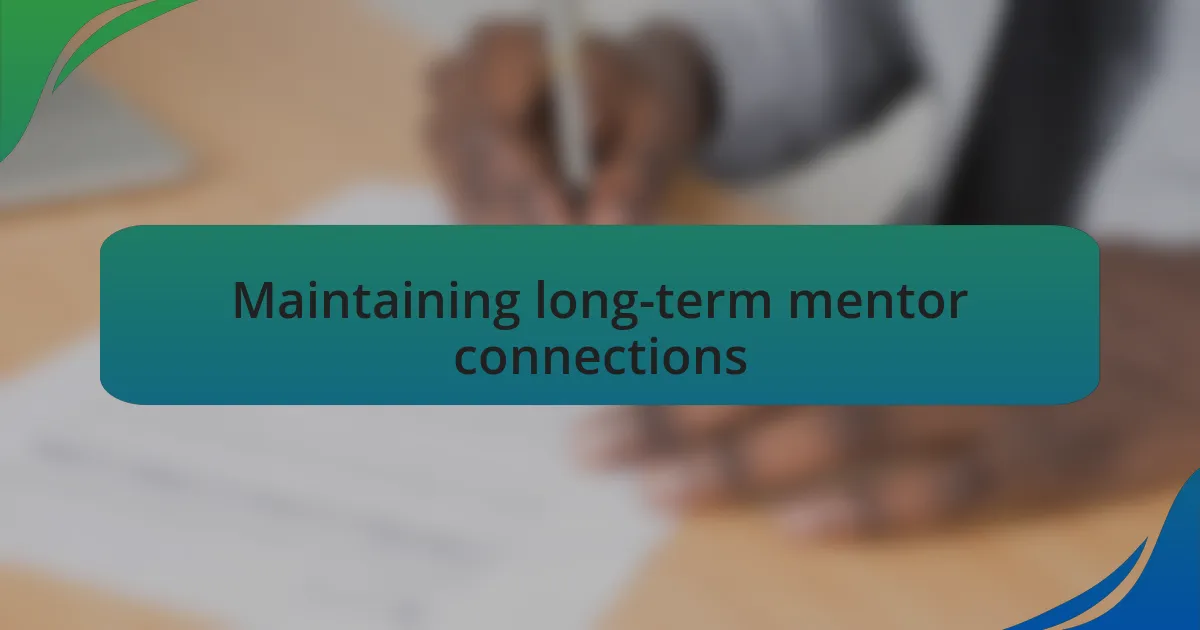
Maintaining long-term mentor connections
Maintaining long-term mentor connections hinges on consistent and meaningful interactions. I recall a time when I set up bi-monthly coffee chats with my mentor, where we would casually discuss not just professional issues but also life aspirations. These relaxed settings allowed us to maintain a strong connection while making it easier to share both successes and challenges—don’t you think a good cup of coffee makes profound conversations even better?
Another vital aspect is the willingness to adapt the relationship as time passes. I once transitioned from seeking tactical advice to discussing strategic visions as my career evolved. This shift made our interactions feel new and relevant, and it emphasized that a mentor-mentee relationship is not a fixed entity but rather a living dialogue. Have you thought about how your needs might change over time, and how that can shape your connection?
Lastly, I believe investing time in your mentor’s growth is equally important. I made it a point to keep my mentor updated on my career milestones, which often included their input in those successes. This approach wasn’t just about celebrating my achievements; it showed that I was invested in their insight and expertise as much as they were in my journey. Would you agree that sharing the spotlight enhances the mutual respect in a mentor connection?
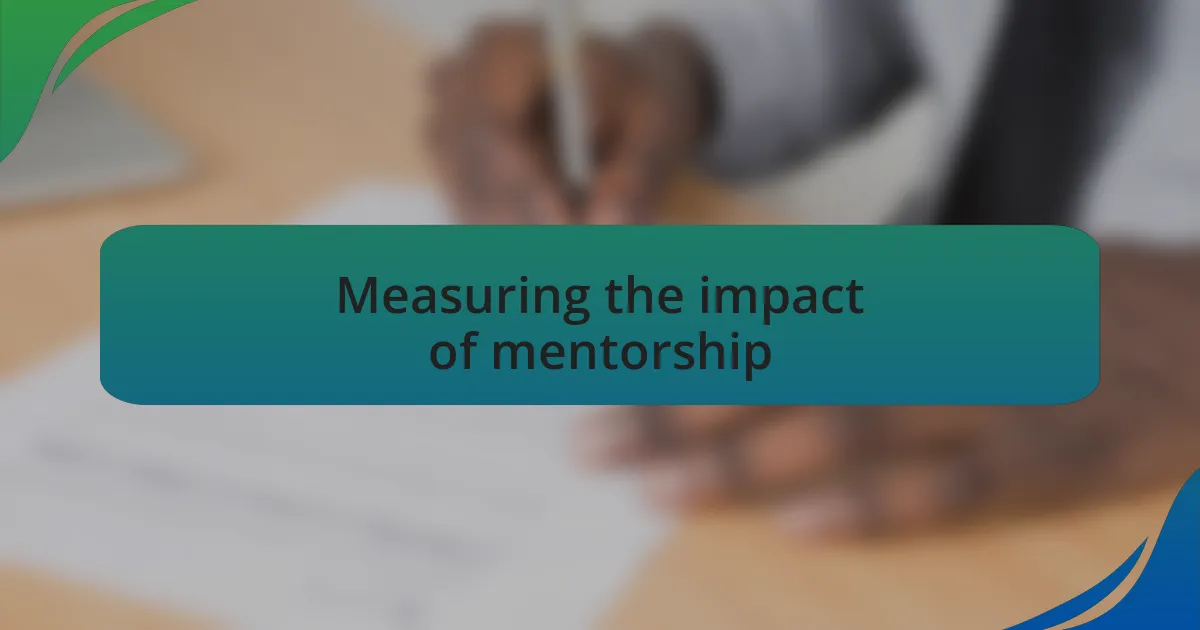
Measuring the impact of mentorship
When it comes to measuring the impact of mentorship, I find that qualitative assessments often provide deeper insights than mere statistics. For instance, after receiving guidance from my mentor during a challenging project, I felt a noticeable boost in my confidence and decision-making skills. Reflecting on that experience made me realize how invaluable a mentor’s support can be—have you considered how specific instances of mentorship shaped your professional abilities?
On the other hand, quantitative metrics also play a significant role. I remember tracking my career progression, noting increased promotional opportunities and salary growth after engaging with my mentor. It was eye-opening to connect the dots between mentorship and tangible outcomes. How have you noticed your achievements aligning with your mentorship experiences?
Finally, feedback from peers and mentors themselves can shine a light on the relational dynamics at play. After asking my mentor for feedback on my development, I was surprised to hear how much they valued my commitment and growth. This revelation underscored the reciprocal nature of mentorship—what measurable outcomes have arisen from your own mentorship relationships that you might not have expected?